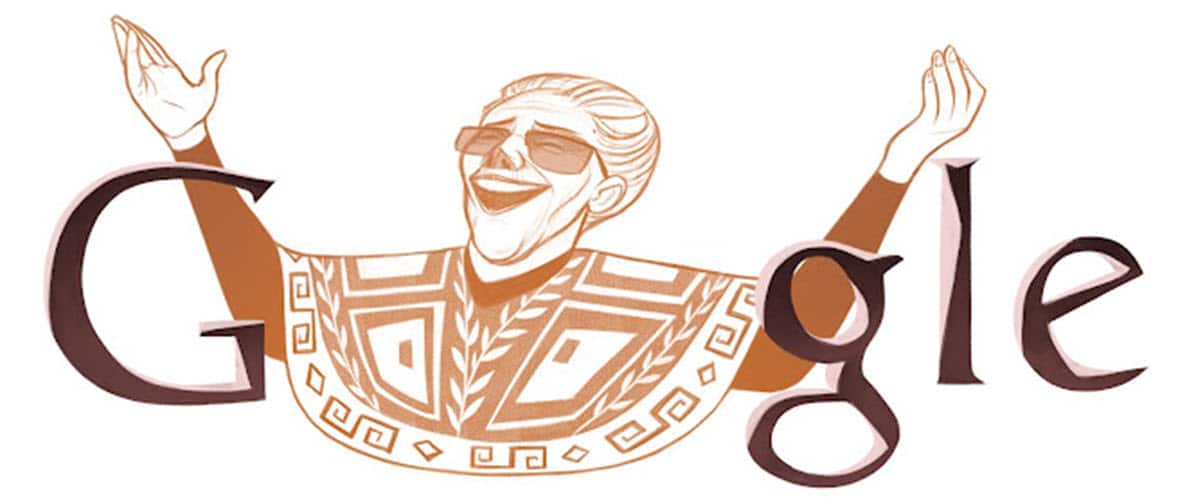Chavela Vargas: The Defiant Voice of Mexican Ranchera Music

Image Courtesy: Google Doodle
Chavela Vargas (17 April 1919 – 5 August 2012) was a Mexican singer. She was especially known for her rendition of Mexican rancheras, but she is also recognized for her contribution to other genres of popular Latin American music.
Life and Career
She was born on 17 April 1919, in San Joaquín de Flores, Costa Rica, and spent much of her life in Mexico, where she became a prominent figure in the music scene. Vargas’s early life was marked by a tumultuous upbringing. She was openly lesbian in a time when it was not widely accepted, and she faced discrimination and rejection from her family and society. She left Costa Rica and immigrated to Mexico in her late teens, where she began her music career.
Vargas’s music was characterized by her raw and emotional performances, often drawing on themes of love, heartbreak, and longing. Her distinctive voice, often described as haunting and powerful, combined with her unique stage presence made her a revered figure in the world of Latin American music.
In the 1950s and 1960s, Vargas gained popularity in Mexico’s bohemian artistic and intellectual circles, performing in small venues known as cantinas, where she became known for her powerful renditions of rancheras, boleros, and other traditional Mexican music genres. Despite facing discrimination and backlash for her sexual orientation, Vargas’s talent and charisma earned her a dedicated fan following.
Vargas’s career experienced a decline in the 1970s due to her struggles with alcoholism and other personal challenges. However, she made a comeback in the late 1980s and 1990s, gaining international recognition for her music. She released numerous albums during her career and collaborated with renowned musicians and composers.
Apart from her music, Vargas also had a notable presence in Mexican cinema. She appeared in several films, including “Frida” (2002), directed by Julie Taymor, which depicted the life of the renowned Mexican artist Frida Kahlo. Vargas’s music was also featured in various films and documentaries, further cementing her cultural impact.
Vargas’s unapologetic and rebellious spirit, along with her unique voice and stage presence, made her an icon in the LGBTQ+ community and a symbol of empowerment for marginalized groups. She was known for her androgynous appearance, often wearing men’s clothing and defying gender norms, which challenged societal expectations at the time.
Chavela Vargas passed away on 5 August 2012, in Cuernavaca, Mexico, at the age of 93. Her legacy as a pioneering artist and cultural icon continues to inspire musicians, LGBTQ+ individuals, and fans of Latin American music around the world. Her contributions to Mexican music and her unwavering spirit continue to be celebrated, and her music continues to be cherished for its emotional depth and timeless appeal.
Award and Legacy
She received the Lifetime Achievement Award at the 8th Annual Latin Grammy Awards In addition to her musical legacy, Chavela Vargas was also known for her boldness and defiance of heteronormativity. She dressed as a man, smoked cigars, drank heavily, and carried a gun. Her bold queerness has inspired many artists, including Costa Rican American singer Dorian Wood, who performed a tribute to Chavela titled “Xavela Lux Aeterna” as part of the Legacy Award.
Chavela Vargas’s legacy extends beyond her awards. She is remembered as a trailblazer and an icon in the LGBTQ+ community, as well as a symbol of empowerment for marginalized groups. Her unapologetic and rebellious spirit, her androgynous appearance, and her powerful performances challenged societal norms and pushed boundaries, making her a cultural icon and inspiration for generations to come.
Vargas’s music continues to be celebrated for its emotional depth, authenticity, and timeless appeal. Her soulful voice, combined with her unique interpretations of traditional Mexican music genres, has left a lasting impact on the music world. Her songs have been covered by numerous artists, and her influence can be heard in the works of contemporary musicians.
Furthermore, Vargas’s impact as a cultural icon and LGBTQ+ trailblazer cannot be overstated. She paved the way for queer artists to express themselves freely and openly in the music industry, and she continues to be celebrated as an LGBTQ+ icon for her courage, resilience, and contributions to the arts.
In recognition of her contributions to music and culture, Chavela Vargas’s legacy has been commemorated in various ways, including documentaries, exhibitions, and cultural events. Her music and her story continue to inspire and resonate with people around the world, and she remains a revered figure in the music industry and a symbol of empowerment for marginalized communities.
On 17 April 2013, Google celebrated Chavela Vargas’ 94th Birthday with a doodle.
Observer Voice is the one stop site for National, International news, Sports, Editor’s Choice, Art/culture contents, Quotes and much more. We also cover historical contents. Historical contents includes World History, Indian History, and what happened today. The website also covers Entertainment across the India and World.

